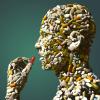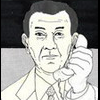
GPC (choline), Uridine, DHA
#991
Posted 17 April 2012 - 10:06 PM
Getting the dose right is a personal thing, since you've already tried the higher dose, I'd actually try 150mg orally instead for a whike. I suspect, as you say, you may be a non-responder, though.
#992
Posted 17 April 2012 - 10:11 PM
I think I mention it regularly, but generally, caffeine and uridine is not a good idea.
Uridine amplifies caffeine's effects and because caffeine will occupy the same receptors, it reduces the effect of uridine on other functions.
#993
Posted 18 April 2012 - 11:31 AM
Also how does it synergize with the racetams?
#994
Posted 18 April 2012 - 11:46 AM
My mains problems are brain fog, Fatigue, Balance and Coordination problem,Memory and Recall problem.,Running nose and itchy eyes, PE,panic attack, sweatiness,
When I do have fatigue at work, I get quite irritable and when speaking the words just doesn't comes out right, Also I noticed when I do have fatigue there is a "kicking like" movement in my right leg,just for a split second.I don't have fatigue at home.
Also I can't seem to pass my driving test because I keep missing the road signs.
Please do not look only into this brain issues which can be just the top of the whole problem.. your root cause can be somewhere else.. I would look into traditional chinese medicine and also watch carefully the food you eat. Most of the problems you describe have people today just because of the bad food they eat.. Improving brain health can be only short term solution..
Thanks Vojtech. I will look into this. I have been thinking about Gluten intolerance lately, so it just could be.Thanks.
#995
Posted 18 April 2012 - 11:47 AM
Edited by MEMOREX, 18 April 2012 - 11:48 AM.
#996
Posted 18 April 2012 - 12:00 PM
I will see how it goes without the alpha gpc,although i don't notice the fatigue when I am at home.I am also thinking of reducing my supplements as I think I might be over working my liver.. Thanks.
#997
Posted 18 April 2012 - 02:30 PM
Also how does it synergize with the racetams?
It doesn't interfere with the effects I usually attribute to piracetam. It doesn't enhance any of its effects by any means either. That doesn't mean it will be the same for you of course. You'll just have to try it out for a couple of weeks I think.
#998
Posted 18 April 2012 - 05:40 PM
Thanks Mr Happy. I have seen a Liver specialist in the past and was given the all clear.Blood test was also fine,the only thing there were concern about was high potassium, but I am thinking someone with fatigue should have low and not high potassium.
I will see how it goes without the alpha gpc,although i don't notice the fatigue when I am at home.I am also thinking of reducing my supplements as I think I might be over working my liver.. Thanks.
Interesting, I just had some blood work and testing done by my cardiologist. He said everything looks great (heart, valves, EKG, etc.). The blood levels were fine except he noticed I had an elevated potassium level. Not saying this is related to you, but am wondering if the UMP is contributing. Anyway, high potassium levels could be a result of bad lab procedures (e.g., old sample), so I am getting retested in a couple of months. We will see if it is still high. The only other issue the cardiologist mentioned was my high bp (~130/85). I am currently supplementing to deal with that unwelcome situation.
BTW - have any of you long time uridine users actually checked your blood pressure lately? I bought a unit for about $100 online and use it every day now. It would be interesting to see other readings from the forum.
edit: spelling
Edited by owtsgmi, 18 April 2012 - 05:42 PM.
#999
Posted 18 April 2012 - 05:45 PM
Owtsgmi (and others) - I would point the finger squarely at coffee.
I think I mention it regularly, but generally, caffeine and uridine is not a good idea.
Uridine amplifies caffeine's effects and because caffeine will occupy the same receptors, it reduces the effect of uridine on other functions.
Yes...I have realized it is time to ditch my coffee. I am down to about half a cup in the morning and looking to quit.
#1000
Posted 19 April 2012 - 01:28 AM
Potassium Channels/*physiology
Uridine/*pharmacology
Uridine Monophosphate/*pharmacology
Animals ; Anti-Arrhythmia Agents/pharmacology ; Electrocardiography/drug effects ; Male ; Myocardial Ischemia/drug therapy ; Rats ; Rats, Wistar ; Uridine Diphosphate/pharmacology Abstract: The activity of mitochondrial ATP-dependent potassium channel (mitoKATP) of rat heart and liver mitochondria was shown to decrease during aging. This partially explains the increase of risk of ischemia at a mature age since mitoKATP activation provides cardioprotection. We demonstrated that uridine-5'-diphosphate (UDP) possesses the property to activate mitoKATP. At a concentration of 30 microM, it reactivated mitoKATP in mitochondria, and 5-hydroxydecanoate (5-HD) eliminated this effect. In experimental animals, UDP precursors uridine and uridine-5'-monophosphate (UMP) (both 30 mg/kg, administered intravenously 5 min before coronary occlusion) decreased the myocardium ischemic alteration index (1.9 and 3.5 times, respectively) and the T-wave amplitude within 60 min after occlusion. Both effects were inhibited by Glibenclamide (Glib) and 5-HD. UMP and uridine decreased the number of premature ventricular beats 5.6 and 1.9 times and the duration of ventricular tachycardia 9.4 and 4.1 times, respectively. Glib and 5-HD inhibited the anti-arrhythmic parameters, 5-HD being less effective. Uridine and UMP decreased the duration of fibrillation 10.8 and 3.6 times, respectively, and this effect was not abolished by Glib and 5-HD. Thus, uridine and UMP, which are the precursors of UDP in the cell, possess cardioprotective properties. MitoKATP prevents mainly ischemic injuries and partially rhythm disorders.
#1001
Posted 19 April 2012 - 01:39 AM
Myocardial Ischemia/*metabolism
Uridine Monophosphate/*metabolism
Uridine Triphosphate/*metabolism
Animals ; Energy Metabolism ; Male ; Myocardial Ischemia/pathology ; Rats ; Rats, Wistar Abstract: In experiments on rats, uridine-5'-monophosphate and uridine-5'-triphosphate reduced the intensity of anaerobic glycolysis and preserved glycogen stores and creatine phosphate balance during the first 60 min after occlusion of the left coronary artery. However, the energy-protective effect of uridine-5'-triphosphate developed 15 min later than the effect of uridine-5'-monophosphate. Uridine-5'-monophosphate, but not uridine-5'-triphosphate, reduced T wave amplitude on ECG and decreased the volume of ischemic injury to the myocardium.
#1002
Posted 19 April 2012 - 01:45 AM
Adenosine A2 Receptor Agonists*
Antihypertensive Agents/*administration & dosage
Blood Pressure/*drug effects
Carotid Arteries/*drug effects
Cytidine/*administration & dosage
Hypotension/*chemically induced
Uridine/*administration & dosage
Adenosine/blood ; Animals ; Antihypertensive Agents/adverse effects ; Antihypertensive Agents/blood ; Caffeine/administration & dosage ; Carotid Arteries/metabolism ; Carotid Arteries/physiopathology ; Consciousness ; Cytidine/adverse effects ; Cytidine/blood ; Dose-Response Relationship, Drug ; Heart Rate/drug effects ; Hypotension/metabolism ; Hypotension/physiopathology ; Injections, Intravenous ; Injections, Intraventricular ; Male ; Rats ; Rats, Wistar ; Receptor, Adenosine A1/metabolism ; Receptor, Adenosine A2A/metabolism ; Theobromine/administration & dosage ; Theobromine/analogs & derivatives ; Theophylline/administration & dosage ; Theophylline/analogs & derivatives ; Time Factors ; Triazines/administration & dosage ; Triazoles/administration & dosage ; Uridine/adverse effects ; Uridine/blood ; Ventricular Function, Left/drug effects ; Ventricular Pressure/drug effects ; Xanthines/administration & dosage Abstract: In the present study, we investigated the cardiovascular effects of intravenously injected uridine or cytidine, and the role of adenosine receptors in mediating these effects, in conscious normotensive rats. Intravenous (i.v.) administration of uridine (124, 250, 500 mg/kg) dose-dependently decreased arterial pressure and heart rate. Cytidine (124, 250, 500 mg/kg; i.v.) produced slight dose-related hypotension without changing heart rate. Plasma uridine and cytidine concentrations increased time- and dose-dependently while plasma adenosine levels did not change after injection of the respective nucleosides. Pretreatment with intravenous caffeine (20 mg/kg), 8-phenyltheophylline (8-PT) (1 mg/kg), nonselective adenosine receptor antagonists, or 8-p-sulfophenyltheophylline (8-SPT) (20 mg/kg), a nonselective adenosine receptor antagonist which does not cross the blood-brain barrier, abolished the cardiovascular effects of uridine (250 mg/kg; i.v.) or cytidine (250 mg/kg; i.v.). Intracerebroventricular (i.c.v.) caffeine (200 microg) or 8-SPT (50 microg) pretreatment did not change the magnitude of the cardiovascular responses induced by nucleosides. Intravenous 8-cyclopenthyl-1,3-dipropylxanthine (DPCPX) (5 mg/kg), a selective adenosine A(1) receptor antagonist, greatly attenuated the cardiovascular responses to uridine and cytidine. Pretreatment with 3,7,-dimethyl-1-propargylxanthine (DMPX) (2 mg/kg), an adenosine A(1)/A(2) receptor antagonist, attenuated hypotension induced by uridine and blocked the arterial pressure decrease in response to cytidine. Uridine-induced bradycardia was blocked by DMPX. 4-(2-[7-amino-2-(2-furyl[1,2,4]-triazolo[2,3-a[1,3,5]triazin-5-yl-aminoethyl)phenol (ZM241385) (1 mg/kg; i.v.), a selective adenosine A(2A) receptor antagonist, pretreatment produced an only very small blockade in the first minute of the hypotensive effects of uridine without affecting the bradycardia. ZM241385 pretreatment completely blocked cytidine's hypotensive effect. In Langendorff-perfused rat heart preparation, uridine (10(-3) M), but not cytidine, decreased the heart rate. Our results show that intravenously injected uridine or cytidine is able to decrease arterial pressure by activating peripheral adenosine receptors. The data also implicates that the mainly adenosine A(1) receptor activation is involved in the uridine-induced cardiovascular effects, while both adenosine A(1) and A(2A) receptor activations mediate the cytidine's effects.
#1003
Posted 19 April 2012 - 01:49 AM
#1004
Posted 19 April 2012 - 01:54 AM
do you know which dopamine receptors uridine modulates ,is it all of them or does it modulate only a couple?
Edited by Ampa-omega, 19 April 2012 - 01:55 AM.
#1005
Posted 19 April 2012 - 04:40 AM
Well, hopefully that answers the question about blood pressure and cardio effects.
Yes, it looks pretty definitive. Uridine does not increase blood pressure. Thanks for confirming that!
Any chance it could increase blood potassium levels? I noticed potassium was mentioned in the first citation, but I am still getting used to reading these pubmed articles...
#1006
Posted 19 April 2012 - 11:16 AM
Thanks Mr Happy. I have seen a Liver specialist in the past and was given the all clear.Blood test was also fine,the only thing there were concern about was high potassium, but I am thinking someone with fatigue should have low and not high potassium.
I will see how it goes without the alpha gpc,although i don't notice the fatigue when I am at home.I am also thinking of reducing my supplements as I think I might be over working my liver.. Thanks.
Interesting, I just had some blood work and testing done by my cardiologist. He said everything looks great (heart, valves, EKG, etc.). The blood levels were fine except he noticed I had an elevated potassium level. Not saying this is related to you, but am wondering if the UMP is contributing. Anyway, high potassium levels could be a result of bad lab procedures (e.g., old sample), so I am getting retested in a couple of months. We will see if it is still high. The only other issue the cardiologist mentioned was my high bp (~130/85). I am currently supplementing to deal with that unwelcome situation.
BTW - have any of you long time uridine users actually checked your blood pressure lately? I bought a unit for about $100 online and use it every day now. It would be interesting to see other readings from the forum.
edit: spelling
Owtsgmi, I had my blood test months before I started started taking uridine. I wouldn't know the effect.
#1007
Posted 19 April 2012 - 03:48 PM
As for mid/long term, I don't have the papers in front of me at the moment on which specific dopamine receptor densities are increased. I'll get back to you after I next have a skim through the full-text journals.
#1008
Posted 20 April 2012 - 05:30 AM
Abstract
Uridine, uridine monophosphate (UMP) and uridine diphosphate (UDP) increased blood pressure when infused into intact anaesthetized rats and had similar effects on the perfusion pressure in the rat isolated perfused kidney. In an isolated vascular preparation, the everted rat portal vein, uridine was without effect while UMP and UDP caused log dose-related increases in contractile work. Adenosine infused at a dose of 200 nmol/kg per min blocked the response to uridine in the intact rat, converting it to a depressor response at higher doses, and reduced the response to UMP. Uridinemay need to be phosphorylated to UMP to act on blood vessels. The two compounds are effective at similar dose ranges and suppress renin secretion in the isolated kidney, while UDP, which is effective at lower doses and stimulates renin secretion, may act by a different mechanism. Adenosine competes for membrane transport with uridine but its inhibition of the effects of UMP is consistent with activity at intracellular sites as well.
#1009
Posted 20 April 2012 - 11:12 AM
#1010
Posted 20 April 2012 - 02:30 PM
#1011
Posted 20 April 2012 - 06:00 PM
Ampa-omega - it modulates dopamine release as a short-term effect.
As for mid/long term, I don't have the papers in front of me at the moment on which specific dopamine receptor densities are increased. I'll get back to you after I next have a skim through the full-text journals.
Ive been looking for the paper that mentions which dopamine receptor subtypes are modulated, and been having a struggle finding it, if you ever find out can you reply back or send me any links if you can.
was the paper that mentions dopamine modulation by uridine posted in this thread? it might mention the Dopamine receptor subtypes
Edited by Ampa-omega, 20 April 2012 - 06:05 PM.
#1012
Posted 20 April 2012 - 09:43 PM
#1013
Posted 20 April 2012 - 10:54 PM
If you have time, would you please read and comment on this post http://www.longecity..._fromsearch__1.
I would appreciate as much informed comment as I can get before I see my doctor tomorrow.
Thanks
Mike
#1014
Posted 20 April 2012 - 11:09 PM
Ampa-omega - it modulates dopamine release as a short-term effect.
As for mid/long term, I don't have the papers in front of me at the moment on which specific dopamine receptor densities are increased. I'll get back to you after I next have a skim through the full-text journals.
Ive been looking for the paper that mentions which dopamine receptor subtypes are modulated, and been having a struggle finding it, if you ever find out can you reply back or send me any links if you can.
was the paper that mentions dopamine modulation by uridine posted in this thread? it might mention the Dopamine receptor subtypes
interesting link here
http://www.google.co...c2GPUSqbAb42Tkg
TAU seems to effect d2 receptors since it knocked off a d2 antagonist from binding..
increases storage and release of dopamine, TAU increases cytoskeletal proteins that participate in intracellular axonal transport, which might, be involved in modulating neurotransmitter release. uridine increases the release of cholecystokinin which modulates dopamine receptors[1]
http://www.sciencedi...165614799012985
eh. your right i would have to buy the full text . maybe in the future
http://www.ncbi.nlm....cles/PMC161741/
i really would like urdine if it modulated multiple dopamine receptors
Edited by Ampa-omega, 20 April 2012 - 11:14 PM.
#1015
Posted 21 April 2012 - 06:45 AM
Vasoconstrictor effects of uridine and its nucleotides and their inhibition by adenosine.
Abstract
Ok, so there is contradictory studies about the uridine/bp connection. The good thing is we are all walking data points. Taking your blood pressure is easy. Let's see some numbers from regular
Uridine users. I am between 120/83 and 140/96. It seems to go up as the day goes on.
Uridine, uridine monophosphate (UMP) and uridine diphosphate (UDP) increased blood pressure when infused into intact anaesthetized rats and had similar effects on the perfusion pressure in the rat isolated perfused kidney. In an isolated vascular preparation, the everted rat portal vein, uridine was without effect while UMP and UDP caused log dose-related increases in contractile work. Adenosine infused at a dose of 200 nmol/kg per min blocked the response to uridine in the intact rat, converting it to a depressor response at higher doses, and reduced the response to UMP. Uridinemay need to be phosphorylated to UMP to act on blood vessels. The two compounds are effective at similar dose ranges and suppress renin secretion in the isolated kidney, while UDP, which is effective at lower doses and stimulates renin secretion, may act by a different mechanism. Adenosine competes for membrane transport with uridine but its inhibition of the effects of UMP is consistent with activity at intracellular sites as well.
#1016
Posted 21 April 2012 - 06:48 AM
Ok, so there is contradictory studies about the uridine/bp connection. The good thing is we are all walking data points. Taking your blood pressure is easy. Let's see some numbers from regular
Uridine users. I am between 120/83 and 140/96. It seems to go up as the day goes on.
#1017
Posted 21 April 2012 - 08:34 AM
#1018
Posted 21 April 2012 - 12:05 PM
#1019
Posted 21 April 2012 - 12:08 PM
#1020
Posted 21 April 2012 - 03:07 PM
There may be different vascular effects in different areas:
http://circres.ahajo.../3/343.full.pdf
Good find! It concludes by saying that ATP and UTP Increase coronary blood flow. Not sure what to conclude but it doesn't give me the warm fuzzies. I have dropped my uridine intake to once in the morning at 200mg from twice per day about two weeks ago with no associated decrease in bp so there is no correlation there. If there is some correlation it would appear to be more of a longer term effect. I guess I would need to stop uridine cold for a time and see if my bp goes down. But, I like it too much and want to explore other natural bp reducers first.
Also tagged with one or more of these keywords: choline, uridine, dha, omega-3, epa, ump, tau, b vitamins
28 user(s) are reading this topic
0 members, 26 guests, 0 anonymous users
-
Bing (2)


















































